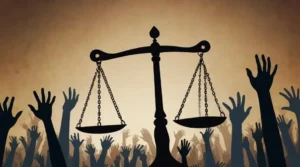The word Law means “the body of those rules and principles which are recognized and applied by the state in the administration of justice” (John Salmond).
Law and Legislation
Laws are essentially a set of guidelines that outline permissible and prohibited actions. Legislation is equivalent to statutory law. Such laws are often enacted by a legislature or the governing authority of a nation. Legislation may also denote the procedure of formulating laws.
Law as an Instrument of Social Change
The law serves as an instrument for facilitating social change. The law adapts to the needs of society, or society itself modifies the law through the creation of new statutes. It is crucial for society to go through social changes in order to foster development. However, this change can be achieved through legal means. Otherwise, overcoming cultural barriers can be quite challenging. If we want to bring about change in society, the most powerful tool at our disposal is the law. If a certain action is prohibited by the law, then it must carry consequences.
There are several laws in place that address important issues such as child marriage, child labor, bonded labor, and access to education. Furthermore, there are initiatives established to safeguard the welfare and security of women and children, which encompass the provision of maintenance for Muslim women and children, the rehabilitation of children of sex workers, and the protection of women from workplace sexual harassment.
Methods of Effecting Legal Change
Furthermore, there are provisions for compensating victims of crime. These laws and measures aim to create a safer and more equitable society. Law and social change is a fascinating field that investigates the social issues that plague our society and explores potential solutions through a legal perspective. There are two distinct methods of effecting legal change.
First, it’s important to recognize that the law has a significant impact on society i.e. “law changes the society”. When laws are put in place, they have the power to shape and transform the way society functions. In the event of a legal disagreement, the judiciary possesses the authority to mandate societal compliance with established conventions or rules, grounded in the notion of the rule of law.
Secondly, society have the capacity to influence the law i.e. “society changes the law”. This means that the law is created by the society based on its needs and through its democratic processes. For example, legislative or by-laws can be adjusted to align with the wishes of society.
Formalizing and Enforcing New Norms
The Law has the power to establish and uphold new social norms, making them the recognized standard of behavior. The law has the potential to challenge and dismantle entrenched power structures that contribute to inequality and discrimination. The law plays a vital role in driving social change by establishing guidelines for behavior, questioning prevailing norms, and advocating for justice and equality in society. Understanding the complex relationship of law, culture, and society, the establishment and enforcement of new norms via legal mechanisms may significantly contribute to long-term societal advancement.

Challenging Existing Power Structures
The law has the potential to address and dismantle prevailing power dynamics that contribute to unfairness and prejudice. Confronting systemic biases in law to foster social change necessitates the acknowledgment and challenge of power systems that perpetuate inequity. It involves championing for legislation that fosters fairness, inclusivity, and responsibility; assisting marginalized communities in their pursuit of equal representation; and promoting public engagement in decision-making procedures. Ultimately, the goal is to foster a fair and inclusive society where every individual’s perspective is valued. Consider the Civil Rights Act of 1964 in the United States as an example. This act effectively banned racial segregation and discrimination, opening doors to increased social and economic equality for African Americans.

Promoting Social Justice and Equality
The law is crucial in advancing social justice and equality by protecting the rights of vulnerable groups and addressing entrenched inequalities. Advocating for social justice and equality through the legal system requires the implementation and enforcement of laws that protect human rights, fight against discrimination, and guarantee equitable treatment for everyone. It involves advocating for policies that address systemic inequalities, empower marginalized communities, and foster a more inclusive society where justice prevails and equality thrives. Examples encompass laws that combat discrimination in employment or housing, with the goal of fostering equal opportunities for all members of society.
Providing a Framework for Conflict Resolution
The law provides a structure for peacefully resolving social conflicts and ensuring order is maintained. This framework enables effective communication, collaboration, and resolution, fostering positive societal transformation through a methodical and productive approach. Law as a framework for conflict resolution in social change focuses on creating legal mechanisms to peacefully and fairly address disputes. It involves advocating for mediation, arbitration, and court systems that prioritize fairness and reconciliation. Through providing structured processes for resolving conflicts, the law plays a crucial role in promoting harmony and stability within society.
Reflecting and Adapting to Societal Changes
Law is not isolated from the world around it. It demonstrates a keen awareness of and responsiveness to the changing values and needs of society as time progresses. As societies evolve, legal systems continuously evaluate and revise laws to ensure they are in sync with the ever-changing social dynamics. The law, as a tool for promoting social change, should be flexible and responsive to the evolving norms, values, and needs of society. This involves the need to update legislation to address emerging issues, revise outdated laws, and align legal frameworks with evolving societal standards. Through maintaining a proactive and adaptable approach, the legal system can effectively facilitate constructive societal change.
It is crucial to understand that the law alone cannot solve all social issues. The process can be slow and complex, with the effectiveness of law in this role being influenced by factors such as the strength of social movements, political will, and public acceptance.
Advantages of Law
Uniformity and certainty
If judges were at liberty to decide cases according to their own conceptions of right and wrong. Justice should go wayward and uniform results would not be achieved. It is very easy to have information about the law and to obey it and it is due to its certainty.
Equality
It is made for no individual case and for no particular man. It implies equality to all, whatever is their social or political status.
Publicly Declared
It is essential to adhere to publicly stated norms of justice administration, free from the corrupting influences of wrong motives among those assigned judicial responsibilities.
Freedom from the errors of individual judgement
The law safeguards the administration of justice from human judgment errors. Undoubtedly, the law possesses greater wisdom than its administrators.

Disadvantages of Law
Rigidity
The first defect of law is rigidity. Legal principles are applied to all cases without any allowance for exceptional circumstances.
Conservation
The law cannot confirm the needs of changing times, although man’s conception of truth and justice in a given set of circumstances may have changed. The law does not adjust itself according to the changing circumstances.
Formalism
In modern times, registration and attestation are examples of formalism. The law contains various formalities that lead to red-tapism [1].
Complexity
It is difficult for people to understand the law. Legal theories are often not simple and their language is often elaborate.
[1] Red-tapism refers to the excessive imposition of laws, processes, and regulations by the government, resulting in delays in organizational operations.






